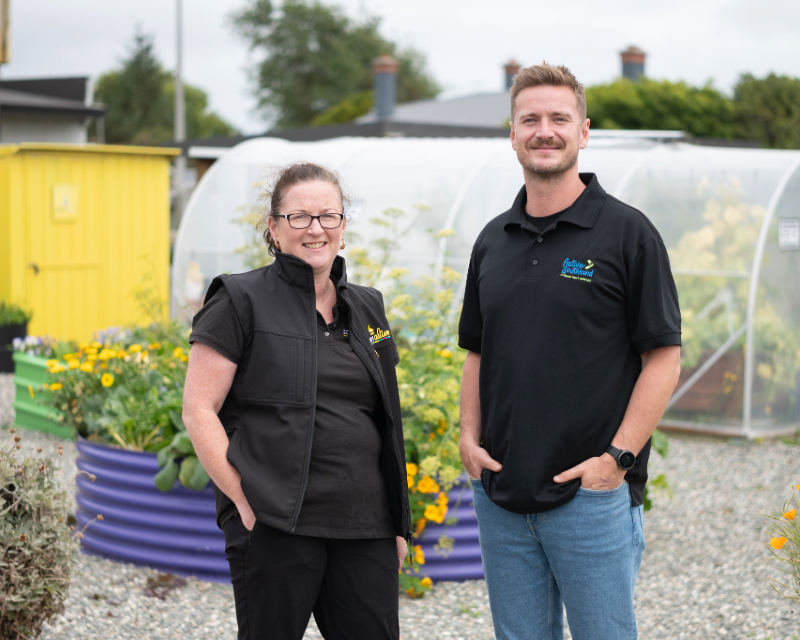Murihiku Kai Collective going strong five years on from award win

Steve Broad reckons there’s a fair bit of looking over fences going on in his neighbourhood, but he doesn’t mind at all.
The recently appointed Murihiku Kai coordinator says he and his Invercargill neighbours have developed somewhat of a food sharing culture.
He remembers one neighbour knocking on his door and enquiring about the rhubarb in Steve’s backyard. Others got in on the act too.
“Now we’re texting each other. We’re sharing rhubarb, tomatoes and cucumbers. We’ve been swapping rhubarb crumbles.”
In late December he took up a pilot role as the region’s first Murihiku Kai Coordinator, based in the Healthy Families Invercargill team at Active Southland.
His role is looking for solutions to ensure that everyone in our community has access to good food, at an affordable price.
“The big picture is can we essentially feed our people from within?”
Formed in 2020, the Murihiku Kai Collective consists of several community groups and individuals working together to create food resiliency in Southland.
It was formed after a Healthy Families study on the local food system highlighted concerns around access to affordable and nutritious food.
It also highlighted a lack of co-ordinated leadership within our community – and the need for a collective vision.
In 2021, the Collective won the Environmental Action in the Community Award at the Environment Southland Community Awards.
Since then, the Collective has continued to support community initiatives and led the way in planning for food resilience.
A design workshop was held in Invercargill in August 2022 with a wide range of participants, to begin to develop a strategy.
Participants shared their vision for Southland’s food system, mapped out the region’s local food systems and identified burning issues.
This led to the release of the ‘Feeding Murihiku Good Food Road Map’ in 2024.
It’s a free, downloadable resource of question tools, regionally relevant conversation topics, and successful, replicable models to share far and wide.
“I’ve always been really fascinated by the kai space, by how we tell our historic stories of the region as a food basket, where we are now, and what we can achieve,” Steve says.
Many of the problems have already been identified and there’s lots of ‘legends’ working to help meet the kai needs in the Southland community, so he sees his role as “elevating, connecting, and bringing collaboration to a sector that he reckons is pretty well equipped”.
We know we have the power to meet the issues faced, and what success looks like.
There’s great examples around New Zealand of models that are working, and cherry-picking what could best work for Southland makes sense.
In Auckland, the Papatoetoe Food Hub model involves the community working with a local supermarket, plus a community garden and a composting service.
The supermarket’s unused food goes to the hub, so there’s savings for them on landfill costs.
It’s a ‘profit for purpose’ model where hub staff turn that food into ready-toserve, pre-prepared and frozen meals for the community.
"There's a whole system to make use of excess food."
The big supermarkets are a part of our community, and we need to work out ways to work alongside them, like Kiwi Harvest is, Steve says.
There’s excess kai across Southland.
Kiwi Harvest takes unused food from supermarkets and other food producers, and supplies it to community social service agencies to help combat food waste and help feed families in need.
That’s one side of the coin – meeting immediate need. The other side is helping people to create kai out of raw produce – whether it’s from our local producer market, supermarket, their own garden or a community garden.
“We presume things about people’s knowledge of what a plant is, how to harvest it, and how to cook it.”
Steve wants to be able to respond in a practical way to what the sector needs now, which could be help with funding applications, letters of support, or facilitating access to a bigger kitchen for groups training people in food preparation.
“How do we make sure that we are achieving actual systems change, and we’re not just skimming the surface of a great idea.”
It’s a matter of heat-seeking where the barriers and the opportunities are, he says.
“I want to sink my teeth into the meaty systems-based issues.”
Helping ensure Southland-produced and supplied food is the easiest, most affordable option is another key challenge, Steve says.
Beyond these more immediate issues lie some really big questions.
“Our ability to feed our region will be around conversations like: what does food production look like moving forward into a change of climate?; How are we supporting our producers?; What crops are we producing?”
Everyone from the grassroots through to the biggest agencies and government have to play a part, Steve says.
“There are great people at the forefront of this. If this community is feeling more connected and there’s more collaboration happening, then in 12 months that’s a massive win.”


